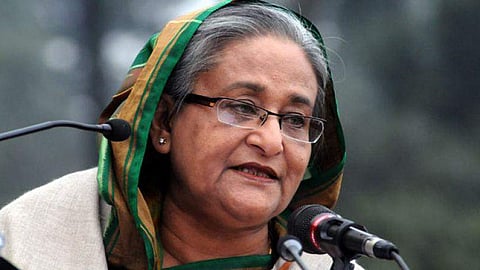Bangladesh sends diplomatic note to India seeking Sheikh Hasina's extradition
BENGALURU: Bangladesh sent a note verbale to India on Monday seeking the extradition of its deposed former prime minister and Awami League leader Sheikh Hasina. Hasina, 77, has been living in exile in India after she fled her country on August 5 following the massive student protests over a controversial job quota provision.
The Bangladesh foreign affairs adviser, who is the de facto foreign minister, Touhid Hossain told media persons that they had sent a note verbale to the Indian government asking New Delhi to send Hasina back “here for the judicial process". The development came after Bangladesh’s home advisor Jahangir Alam said his office had sent a letter to the foreign ministry to “facilitate the ousted premier’s extradition from India,” quoting a prisoner exchange agreement with India “under which it (her extradition) will be carried out.”
The Ministry of External Affairs later confirmed in the evening that they have received the diplomatic note from the interim government in Dhaka. “We confirm that we have received a Note Verbale from the Bangladesh High Commission today in connection with an extradition request. At this time, we have no comment to offer on this matter,” said MEA Spokesperson Randhir Jaiswal.
Speaking to TNIE, former IFS officers and retired high commissioners to Bangladesh Veena Sikri (2003-’06) and Pinak Ranjan Chakravarty (2007-’09) said a “note verbale is not an instrument on which extradition can be sought. India has an extradition treaty with Bangladesh. Extradition is a very long, detailed process involving the judiciary. Request for extradition comes at the end of the process,” said the former diplomats. “The requesting country has to complete the judicial process of proving the charges against the fugitive leader and convicting her,” said Sikri.
She added that the UNHRC (United Nations Human Rights Council) was invited to look and investigate the charges against Hasina. “The UNHRC team has visited Bangladesh twice since August but they have not been provided with any evidence of the charges of murder, forced disappearance and human rights violations against Hasina by the interim government,” added Sikri. “I’m told that Dhaka has sought Hasina’s extradition under a prisoner exchange agreement with India. Hasina is not a prisoner in India. She came here of her own will,” countered the former diplomat.
In India, the Extradition Act, 1962 under the MEA “prescribes separate procedures for handling extradition requests from different countries depending upon the procedural and evidentiary requirements envisaged in the relevant extradition treaty,” states the Extradition Act.
Meanwhile, earlier on Monday the interim government in Bangladesh issued a press statement, which was shared with Indian media, on the initiation of an enquiry into allegations of corruption, embezzlement and money laundering involved in the Rooppur Nuclear Power Plant implicating Hasina, her son Sajeeb Ahmed Wazed (Joy) and niece Tulip Siddiq for allegedly embezzling $5 billion through various offshore bank accounts in Malaysia. Earlier, the Dhaka-based International Crimes Tribunal (ICT) had issued arrest warrants for Hasina and several former Cabinet ministers, advisers, and military and civil officials for “crimes against humanity and genocide".

